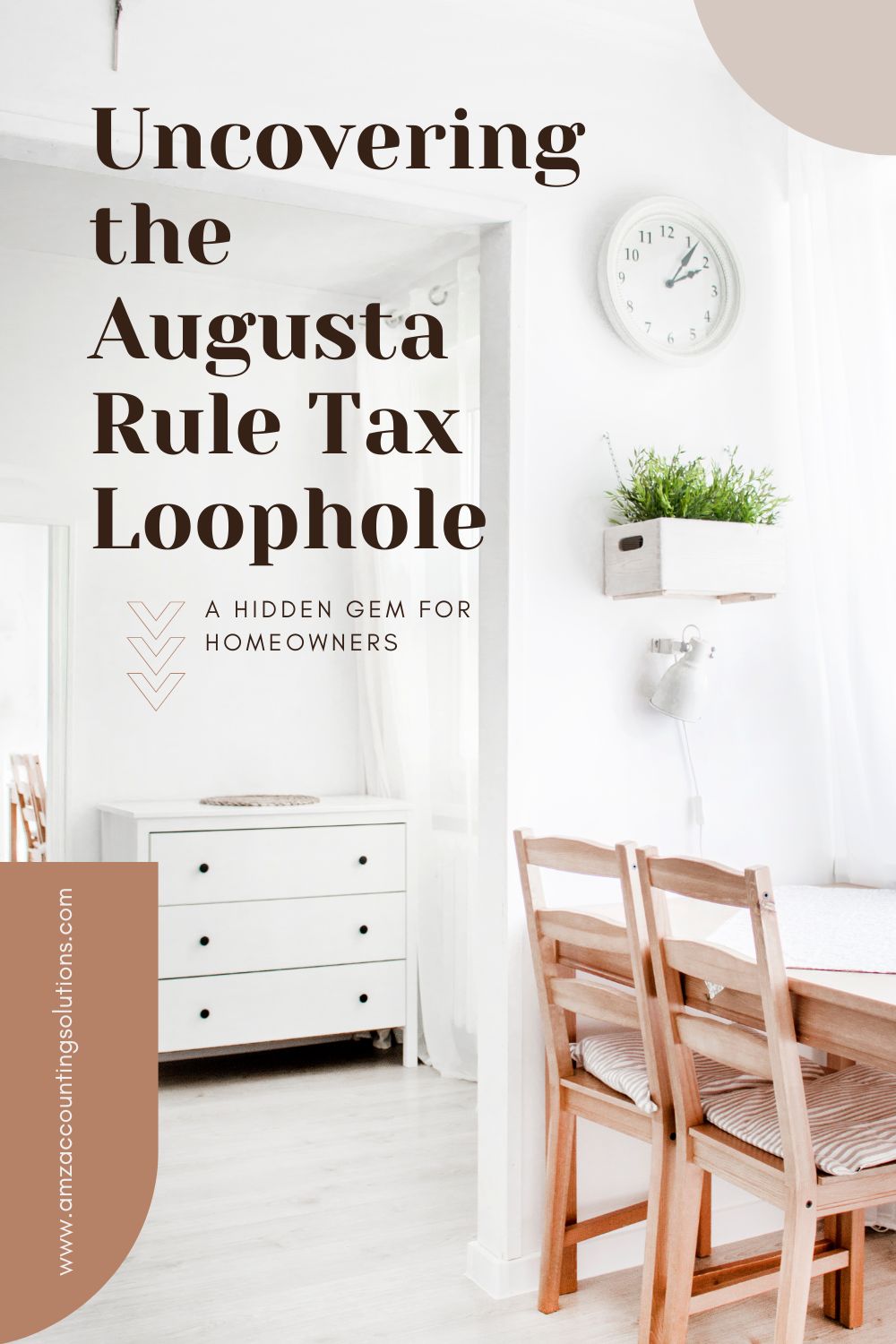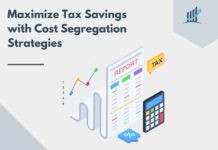Introduction
The Augusta Rule is a tax exemption that has received much attention in recent years. It is often used by homeowners to reduce their tax liabilities and increase their tax-free rental income. Essentially, the rule allows owners of properties that are used for fewer than 15 days per year to avoid paying taxes on rental income received during that time.
The Augusta Rule has been a boon for those who own properties in areas with high demand for short-term rentals, such as vacation destinations or areas hosting large events like conferences and sporting events. This exemption can be a wonderful planning tool, especially for small business owners.

What is the Augusta Rule?
The Augusta Rule is a tax loophole that allows homeowners to rent out their homes for up to 14 days a year without paying any taxes on the rental income. The rule derives its name from Augusta National Golf Club, which hosts the annual Masters Tournament and uses the rule to rent out homes to wealthy patrons during the event.
The Augusta exemption was first introduced in 1926 as part of the Revenue Act. It was designed to allow homeowners in vacation destinations, such as beach towns and ski resorts, to rent out their homes for short periods of time without being subject to taxation on the rental income.
The provision was later extended to cover all homeowners who meet specific criteria, including renting out their home for less than 15 days per year. One of the primary benefits of the Augusta Rule is that it allows homeowners to earn tax-free rental income without having to go through the hassle and expense of setting up a formal rental business.
This can be especially beneficial for people who own second homes or vacation properties that they only use for part of the year. Additionally, because the rule only applies to short-term rentals, it does not create any permanent changes in property usage or ownership.
How Does the Augusta Rule Work?
The Augusta rule Section 280A(g) states in part:
“…if a dwelling unit is used during the taxable year by the taxpayer as a residence and such dwelling unit is actually rented for less than 15 days during the taxable year, then… the income derived from such use for the taxable year shall not be included in gross income…”
To clarify the IRS rules on short-term rentals of personal residences and who is subject to taxation, the following criteria apply:
- The Augusta Rule exemption applies to owners of primary, secondary, and vacation homes who rent out a dwelling unit as a personal residence.
- Expenses for renting out these properties are not deductible.
- The rental period of any unit cannot exceed 14 days in a tax year but does not need to be consecutive.
- Rent prices must be reasonable for that location on that date, comparable to market rates.
For example, renting a house near SoFi Stadium in Los Angeles for $150 per night on a regular day and charging $500, $700, or even $1,000 per night during the leading days of the 2022 Super Bowl should be acceptable as long as the prices are aligned with the market.
When preparing your tax return, you do not need to take any special actions. Just remember not to declare rental revenue to the IRS. However, it’s recommended that you keep comprehensive records if you’re ever asked any questions about your rentals. These records should include proof of home ownership during the rental period, market-based rental rates, and personal use of the property during the tax year.

Benefits of the Augusta Rule
There are several benefits of the Augusta Rule, also known as the Augusta exemption, which allows individuals to rent out their homes for up to 14 days a year without having to report the rental income on their tax returns. One major advantage of this rule is that it provides homeowners with an opportunity to earn extra income from renting out their homes during popular events in their areas, such as golf tournaments or music festivals. Homeowners can take advantage of the increase in demand for rental properties during these times and charge premium rates without worrying about paying taxes on the rental income.
This can provide a significant financial boost for homeowners who are looking to increase their annual income. Another benefit of the Augusta exemption is that it can help offset some of the costs associated with owning and maintaining a second home or vacation property.
By renting out their properties for up to 14 days per year tax-free, homeowners can use this extra income to cover expenses such as property taxes, maintenance costs, and mortgage payments. This can make owning a second home or vacation property more affordable and accessible for many individuals who may not have been able to afford it otherwise.
Overall, the Augusta Rule provides an excellent opportunity for individuals who own second homes or vacation properties to earn additional income without having to worry about paying taxes on that rental income. With so many advantages associated with this tax exemption, it’s easy to see why it’s become such a popular tool among homeowners looking to maximize their financial returns from their real estate investments.
How Business Owners Can Use The Augusta Rule Tax Strategy
The Augusta rule is particularly attractive because it can transfer revenue from a small business. This can be accomplished by renting a vacation home to the business and, in turn, receiving a tax deduction at the business level as well as an exclusion from taxable income at the personal level.
For instance, let’s say you have a stake in a small business. The business rents your vacation home for three days to host a planning retreat for the management team. During this time, key decisions are made for the following year. The rental represents fair market value.
The business can claim a legitimate business expense deduction for the rental fee. As you’ve only rented out the property for three days out of the entire tax year, you will not need to include the income in your personal tax return.
To ensure tax compliance, both you and the business should keep records of the fair rental quote from comparable locations. Additionally, the management team should provide evidence of the business meetings that took place on the rental property.
The Augusta rule is an effective way for small business owners to maximize tax benefits as it allows them to get rental tax benefits while excluding the revenue from taxable income.

FAQs About the Augusta Rule
Q: Who qualifies for the Augusta Rule tax exemption?
A: The Augusta Rule tax exemption applies to anyone who owns a property that is used as their primary residence and rented out for up to 14 days a year. It doesn’t matter whether you own the property outright or if you have a mortgage on it. As long as you meet the criteria, you are eligible for tax-free rental income.
Q: Is there a limit to how much money I can make from renting out my primary residence under the Augusta Rule?
A: No, there is no limit on how much money you can make from renting out your primary residence under the Augusta Rule. However, it’s important to keep in mind that any income generated beyond 14 days will be taxable.
Conclusion
The Augusta Rule remains a viable and advantageous tax loophole for those who qualify. This exemption allows homeowners to rent out their primary residence for up to 14 days a year without incurring taxes on the rental income. Additionally, those who rent out their homes during major events such as The Masters golf tournament or other significant sporting events can earn significant tax-free rental income.
Overall, the Augusta Rule offers a unique opportunity for homeowners to earn additional income through short-term rentals while avoiding the burden of taxes on that rental income. While not suitable for everyone, those who qualify should seriously consider utilizing this tax exemption as part of their financial planning strategy.
Dive deeper into the world of real estate investment and tax strategy by exploring our enlightening pieces on Real Estate Opportunity Zones. These zones offer an intriguing mix of potential returns and advantageous tax provisions – a hidden gem akin to the Augusta Rule tax loophole. Unearth the secrets of profitable investing and learn how to leverage these strategic zones to expand your investment portfolio.










